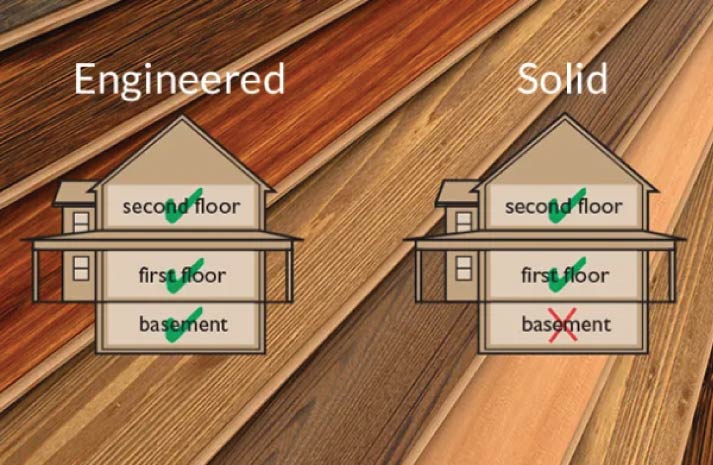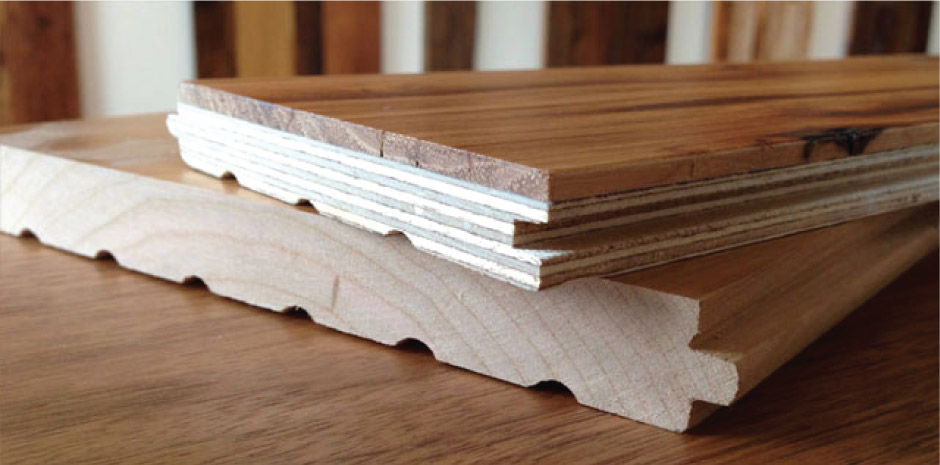Choosing the right hardwood floor for your project is an important decision. Here are some things to consider when choosing the right material.
A Comprehensive Comparison When it comes to selecting hardwood flooring for your home, the choice between solid and engineered hardwood is one that merits careful consideration. Both options offer natural wood’s timeless beauty and warmth, but they differ in construction, installation versatility, durability, and maintenance requirements. Let’s compare comprehensively to help you make an informed decision that fits your specific needs and preferences.
Construction:
Solid Hardwood Flooring: Solid hardwood is milled from a single piece of wood, typically around 3/4 inches thick. This construction contributes to its traditional charm and durability, as it can be sanded and refinished multiple times over its lifespan. Solid hardwood is available in a variety of wood species, each offering its own unique grain patterns and natural hues.
Engineered Hardwood Flooring:
Engineered hardwood comprises multiple layers of wood or plywood, topped with a layer of solid hardwood veneer. The layers are bonded under heat and pressure, resulting in a more dimensionally stable product than solid hardwood. The top layer provides solid hardwoods ‘ authentic look and feel, while the underlying layers enhance their resistance to moisture and temperature changes. Engineered hardwood is available in various thicknesses, with the top veneer ranging from 2 to 6 millimeters in depth.
Installation Versatility: Solid Hardwood Flooring: Solid hardwood is best suited for installation above grade, on or above ground level. Depending on the specific product and installation requirements, it can be nailed or stapled to a wooden subfloor or glued down over a concrete subfloor. It is important to note that solid hardwood is sensitive to moisture and may not be suitable for areas prone to high humidity or potential moisture exposure.
Engineered Hardwood Flooring:
The construction of engineered hardwood provides excellent stability, making it suitable for installation in various environments. It can be installed directly over concrete subfloors, in basements, and in other areas where solid hardwood may be less compatible due to moisture sensitivity. Engineered hardwood can be glued, stapled, or floated during installation, offering versatility and adaptability based on the space’s specific needs.
Durability and Maintenance:
Solid Hardwood Flooring: Solid hardwood, when properly maintained, has the potential to last for generations. It can be sanded and refinished multiple times to refresh its appearance and address surface imperfections. However, solid hardwood is more susceptible to moisture-related damage and temperature fluctuations, requiring diligent maintenance to preserve its integrity.
Engineered Hardwood Flooring:
Engineered hardwood offers enhanced resistance to moisture and temperature changes due to its layered construction. This durability makes it particularly suitable for areas where solid hardwood may need to be more practical, such as basements or regions with fluctuating humidity levels. While engineered hardwood can be refinished, the number of times it can be sanded down depends on the thickness of the top veneer layer.
Aesthetic Options:
Both solid and engineered hardwood flooring offers a vast array of wood species, finishes, and styles, allowing homeowners to select options that complement their interior design preferences. Whether you prefer the rich, classic appeal of oak, the subtle elegance of maple, or the intricate grain patterns of hickory, both solid and engineered hardwood flooring provide a wide range of aesthetic choices to suit your unique vision for your living spaces.
Critical Considerations for Decision-making:
1. Location: Consider the specific environment where the hardwood flooring will be installed. Solid hardwood may be best suited for above-grade areas with stable humidity levels. In contrast, engineered hardwood offers greater flexibility for installation in various spaces, including below-grade and moisture-prone areas.
2. Longevity: Assess your long-term maintenance preferences and the expected wear and tear on the flooring. Solid hardwood’s ability to be sanded and refinished multiple times offers exceptional longevity. In contrast, engineered hardwood’s enhanced resistance to moisture and temperature changes may make it a more practical choice for specific spaces.
3. Design and Aesthetic: Determine the visual impact you wish to achieve in your home. Both solid and engineered hardwood flooring offers an array of wood species, finishes, and styles to help you achieve your desired ambiance and complement your interior design scheme.
In conclusion, choosing between solid and engineered hardwood flooring ultimately depends on your unique circumstances, practical needs, and aesthetic preferences. Whether you lean towards the time-honored appeal of solid hardwood or the enhanced versatility of engineered hardwood, both options provide the unparalleled beauty and warmth of natural wood, elevating the character and value of your home for years to come.

flooring specialists with a creative perspective!
offering brilliant ideas, precise project management, and the best service in the business.

Hilltop Pro Services
59 Greenwood Ave #1, Midland Park, NJ 07432
Professional flooring company, located in Northern NJ and proudly serving:
NEW YORK | NEW JERSEY | CONNETICUT
Tell the PRO's about your next project!





Recent Comments